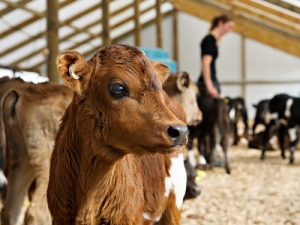The bobby calf care practices revealed in a video by an animal rights group have appalled dairy industry bodies.
Both DairyNZ and Federated Farmers have spoken out against the practices – but say 95% of farmers are compliant with animal welfare codes.
The practices were revealed in video footage recorded by animal rights group Farmwatch and released as part of a SAFE public campaign launched against dairy farming.
DairyNZ chief executive Tim Mackle says cruel and illegal practices are in no way condoned or accepted by the industry as part of dairy farming.
"We are shocked and farmers are too," he says. "We will be asking questions of everyone involved. Farmers don't see what goes on when calves leave their farm and we need to be holding the transport operators and processing plants to account to ensure bad practices get stamped out of our industry," he says.
"Our surveys show that 95% of farmers are compliant with all animal welfare codes and they take great care of their animals including calves. We obviously want to see that even higher because the dairy industry takes its animal welfare responsibilities seriously and we are committed to farming to high standards.
"There is a range of industry initiatives already in place and we will be boosting our actions with other groups to ensure the care of calves."
Federated Farmers' dairy section chair, Andrew Hoggard says "farmers have to farm within strict animal welfare rules and the vast majority care for their animals humanely and responsibly".
He says the footage released by SAFE and Farmwatch includes some appalling behaviour, by a minority of farmers but also by transport companies and slaughterhouse workers. "This is something we and the industry will not tolerate.
"Federated Farmers strongly, and each season, reinforces to its members that the highest standards of animal welfare must apply when dealing with all calves. The federation will also put resources behind any industry initiatives to review the handling, transport and processing of bobby calves," says Mr Hoggard.
Dairy Companies Association of New Zealand executive director Kimberly Crewther says that compliance with the New Zealand codes of welfare is important to dairy companies.
"These codes are internationally recognised as robust. Where there are breaches we fully support and expect Ministry for Primary Industries' compliance action," she says.


















